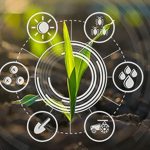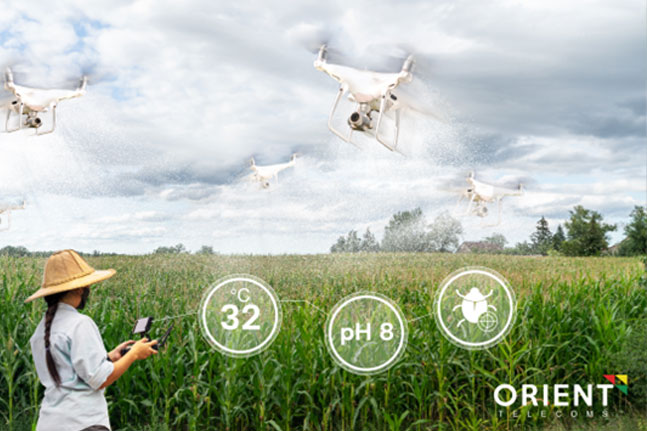
HOW MACHINE LEARNING CAN MAKE AGRICULTURE MORE SUSTAINABLE
September 12, 2023
HOW TECHNOLOGY CAN HELP COMBAT CLIMATE CHANGE IN AGRICULTURE
November 21, 2023Industrialized farming has been a reliable way to produce lots of food at a relatively low cost. But it’s not the bargain it was once believed to be. Unsustainable agriculture can pollute water, air and soil; is a source of greenhouse gases, and destroys wildlife. All told that costs economies about $3 trillion every year. And to top it all off, some farming practices have been linked to the emergence of zoonotic diseases, such as COVID-19.
WHAT EXACTLY IS SUSTAINABLE AGRICULTURE?
It is farming that meets the needs of existing and future generations, while also ensuring profitability, environmental health and social and economic equity. It favours techniques that emulate nature–to preserve soil fertility, prevent water pollution and protect biodiversity. It is also a way to support the achievement of global objectives, like the Sustainable Development Goals and Zero Hunger.
DOES SUSTAINABLE AGRICULTURE REALLY MAKE A DIFFERENCE TO THE ENVIRONMENT?
Yes. It uses up to 56 per cent less energy per unit of crops produced, creates 64 per cent fewer greenhouse gas emissions per hectare and supports greater levels of biodiversity than conventional farming.
WHY DOES SUSTAINABLY PRODUCED FOOD SEEM MORE EXPENSIVE?
It may be costlier because it is more labor-intensive. It is often certified in a way that requires it to be separated from conventional foods during processing and transport. The costs associated with marketing and distribution of relatively small volumes of products are often comparatively high. And, sometimes, the supply of certain sustainably produced foods is limited.
WHY ARE SOME FOODS SO MUCH MORE AFFORDABLE–EVEN WHEN THEY REQUIRE PROCESSING AND PACKAGING?
The heavy use of chemicals, medicines and genetic modification allows some foods to be produced cheaply and in reliably high volumes, so the retail price tag may be lower. But this is deceiving because it does not reflect the costs of environmental damage or the price of healthcare that is required to treat diet-related diseases. Ultra-processed foods are often high in energy and low in nutrients and may contribute to the development of heart disease, stroke, diabetes and some forms of cancer. This is particularly concerning amid the COVID-19 pandemic; the disease is especially risky for those with pre-existing health problems.
HOW TO FEED 10 BILLION PEOPLE? DO WE ALL HAVE TO BE VEGAN?
No. But most of us should eat less animal protein. Livestock production is a major cause of climate change and in most parts of the world, people already consume more animal-sourced food than is healthy. But even small dietary shifts can have a positive impact. The average person consumes 100 grams of meat daily. Reducing that by 10 grams could improve human health while reducing greenhouse gas emissions.
IS SUSTAINABLE AGRICULTURE POSSIBLE IN DEVELOPING COUNTRIES?
Yes. Because sustainably produced food is typically more labor-intensive than conventionally made food, it has the potential to create 30 per cent more jobs. And because it can command higher prices, it can also generate more money for farmers.
IS IT POSSIBLE TO MAKE SUSTAINABLY PRODUCED FOOD THAT IS AFFORDABLE FOR EVERYONE?
Yes. As demand for certain foods increases, the costs associated with production, processing, distribution and marketing will drop, which should make them less expensive for consumers. Policymakers can also play a role, facilitating market access and leveling the financial and regulatory playing field.
IF IT IS SO IMPORTANT, WHY HASN’T SUSTAINABLE FARMING BEEN ADOPTED AS A GLOBAL STANDARD?
There is a lack of understanding of the way that agriculture, the environment and human health intersect. Policymakers do not typically consider nature as a form of capital, so legislation is not designed to prevent pollution and other kinds of environmental degradation. And consumers may not realize how their dietary choices affect the environment or even their own health. In the absence of either legal obligations or consumer demand, there is little incentive for producers to change their approach.
WHAT ARE SOME WAYS TO CONSUME FOOD MORE SUSTAINABLY?
Diversify your diet and cook more meals at home. Eat more plant-based foods; enjoy pulses, peas, beans and chickpeas as sources of protein. Eat local, seasonal foods. Purchase sustainably produced foods and learn more about farming practices and labeling. Avoid excessive packaging, which is likely to end up as landfill. Don’t waste food: eliminating food waste could reduce global carbon emissions by 8-10 per cent. Cultivate your own garden, even if it is a small one in your kitchen. Support organizations, policies and projects that promote sustainable food systems. And discuss the importance of healthy and sustainable foods with producers, vendors, policymakers, friends and family.
The United Nations Environment Programme (UNEP) supports a transition toward global food systems that provide net-positive impacts on nutrition, the environment and farmer livelihoods. Contributing to the One Planet Network Sustainable Food Systems Programme, UNEP has led the development of a guideline for collaborative policymaking and improved governance.
UNEP is also the custodian of the food waste element of Sustainable Development Goal 12.3, which commits member states to halve their per capita food waste at the consumer retail level. Developing the Food Waste Index, UNEP is currently conducting global modelling of food waste data and preparing a harmonized methodology that will enable countries to track progress towards Goal 12.3.
Source: https://www.unep.org/news-and-stories/story/beginners-guide-sustainable-farming





